Penn Vet's Ryan Hospital, Working Dog Center, and New Bolton Center are proud to serve the animals that protect and serve us. Here are some of their remarkable stories of heroism and healing.
Diablo's Story
Shot twice by a crime suspect during a pursuit through the woods, Diablo was brought to Ryan Hospital, where Penn Vet staff found that a bullet had shattered the tibia in his left hind leg. The dog was doing his job to protect the public, even hanging onto the suspect after being shot, until his handler gave the command to release him.
“He was transferred to the ICU, stabilized and treated for shock, then taken to surgery,” recalled Jessica Bosco, a Soft Tissue Surgery Nurse Coordinator at the hospital. Diablo—a Belgian Malinois and member of the New Castle County K-9 unit in Delaware—persevered through his life-threatening injuries and multiple infections.
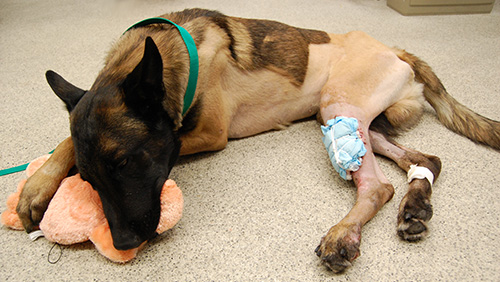 Bosco was glad to be a part of the team that helped Diablo get through the next several weeks of a challenging recovery. “He had a blood transfusion, a metal plate put into his leg, and a bone graft. We had to remove the shattered bone fragments from the leg,” she said. About a year after the accident, he was cleared to go back to work.
Bosco was glad to be a part of the team that helped Diablo get through the next several weeks of a challenging recovery. “He had a blood transfusion, a metal plate put into his leg, and a bone graft. We had to remove the shattered bone fragments from the leg,” she said. About a year after the accident, he was cleared to go back to work.
Rocky's Story
Another working dog and his human partner are back in action thanks to a successful surgical procedure at Ryan Hospital and extensive therapy at the Penn Vet Working Dog Center.
Last March, Jenkintown Police Sergeant Richard Tucker rushed Rocky into the hospital’s Emergency Service because the large German Shepherd couldn’t stop vomiting. He couldn’t even hold down water.
Rocky’s veterinary team soon discovered that he was not just severely dehydrated. He was suffering a colonic torsion—a twisting of the intestines, which can cause obstruction, tissue necrosis, bowel rupture, sepsis, and death.
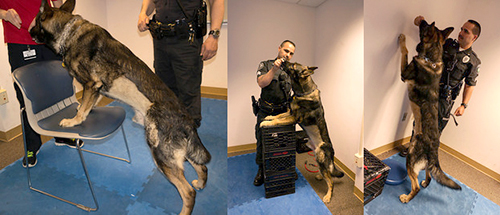 While surgeons successfully untwisted the colon and small bowel from the root of the mesentery, they also had to remove part of Rocky’s descending colon. Recovery was arduous, peppered with loss of appetite and bouts of diarrhea. Rocky lost nearly 14 percent of his body weight and needed a dedicated system of physical rehabilitation to recover his strength.
While surgeons successfully untwisted the colon and small bowel from the root of the mesentery, they also had to remove part of Rocky’s descending colon. Recovery was arduous, peppered with loss of appetite and bouts of diarrhea. Rocky lost nearly 14 percent of his body weight and needed a dedicated system of physical rehabilitation to recover his strength.
Working with Dr. Cindy Otto, Executive Director of the Penn Vet Working Dog Center, and Penn Vet ICU Nurse Tracy Darling, Rocky made progress regaining muscle mass and a healthy body, despite his medical setbacks. About 10 weeks after surgery, Tucker and Rocky earned their narcotics recertification—a significant step toward returning to full-time duty. They continued regular physical rehabilitation at the Working Dog Center as they transitioned back toward full-time criminal apprehension work.
Aron's Story
More recently, a retired K-9 named Aron underwent a lifesaving operation at Ryan Hospital after he was diagnosed with several severe medical issues, including two large tumors in his abdomen and spleen. The Angels for Animals Foundation’s Guardian Angels K-9 Fund successfully raised the money necessary for the surgery, in partnership with Ryan Hospital and the Deptford Police Department in New Jersey. The fund specifically serves police and military K-9s.
Just two years earlier, Aron played a critical role in rescuing a nine-year-old boy with autism who had become stuck in mud up to his neck in a creek in East Greenwich Township, New Jersey. The dog received a Life Saving Award with Valor for his heroic effort.
Training and Caring For Working Dogs
Diablo, Rocky, and Aron are just three of many dogs with law enforcement jobs that come to Penn Vet for care.
“Penn Vet’s Ryan Hospital is the provider of choice for police dogs in Philadelphia, and we provide services for about 30 other police departments outside of Philly,” explained Bo Connell, Executive Director of Ryan Hospital. “Anytime there’s a need, they come here. Local K-9 officers even stop by when their animals don’t need care, just to say hello and to talk to everyone.”
In addition to emergency and trauma center visits, Penn Vet is the go-to place for police dogs when they need wellness examinations, radiology, diagnostic procedures, and pharmaceuticals. Many regional police stations have signed up for an annual con- tract that covers their veterinary needs with a special discount on services, said Jen Lucas, Ryan Hospital’s Director of Finance.
The staff often ends up bonding with the dogs they treat. Bosco, who has worked at Ryan Hospital for 10 years, said that interacting with Diablo and other injured animals in law enforcement makes her appreciate their work even more. “They are really awesome dogs who put their lives on the line as much as the officers do,” she said.
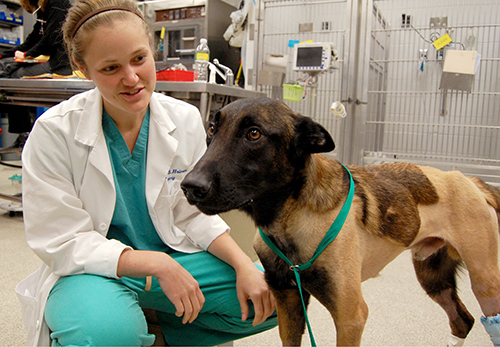 Otto, a board-certified canine sports medicine and rehabilitation specialist, had some milestone moments with Rocky at the Working Dog Center as they focused on regaining his strength and coordination. “Rocky, like many police dogs, had not been trained to be aware of his back feet. So when he climbed the ladder that was part of the normal police dog training, he just flung himself up it,” she recalled.
Otto, a board-certified canine sports medicine and rehabilitation specialist, had some milestone moments with Rocky at the Working Dog Center as they focused on regaining his strength and coordination. “Rocky, like many police dogs, had not been trained to be aware of his back feet. So when he climbed the ladder that was part of the normal police dog training, he just flung himself up it,” she recalled.
“We started working on the exercises we use at the Working Dog Center to teach them about their feet,” Otto continued. “One was having him put all four feet in a cardboard box. It was such a party the day that Rocky finally managed that! Now he is back with us on a regular conditioning program and is really starting to show the benefits of his training.”
Otto was at Ground Zero after the 9/11 terrorist attacks, providing medical care for Federal Emergency Management Agency (FEMA) Urban Search and Rescue canines, and observing firsthand that working dogs were an indispensable part of the rescue process. The experience inspired her to establish the Penn Vet Working Dog Center, and each dog trained at the Center is named in honor of a dog involved in 9/11 rescue operations or a person who died as a result of the attacks.
The Working Dog Center’s foundational training program teaches puppies the essential skills necessary for a successful career in detection. After completion, the dogs are prepared for careers in different disciplines. Those jobs could include search and rescue, law enforcement—such as narcotics, explosives, and suspect search—or sniffing out medical conditions such as ovarian cancer and blood sugar changes in people with diabetes.
“We see what they are best suited for, and let them choose their ‘majors,’” said Major Annemarie DeAngelo, who designed the New Jersey State Police Canine Unit and is the Working Dog Center’s training director. The Center is also on the forefront of research to optimize the health and performance of lifesaving detection dogs, she added.
“The Working Dog Center is unique in the country for the diversity of its training and the individuals who bring talents and research skills from a host of organizations,” DeAngelo said.
“We do a lot of things that are not done in other places. We have more and more law enforcement wanting to train with us because of the high quality.”
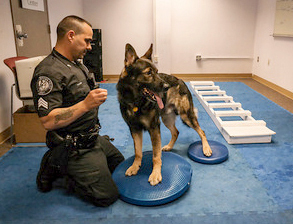 Police officers are a common sight at the Working Dog Center; as the dogs’ handlers, they are a part of the training team. The Center’s Fit to Work program helps handlers keep their dogs fit and conditioned, and also provides critical rehabilitation services to get law enforcement dogs like Rocky back to work. Fit to Work has been adopted by several law enforcement officers including Officer Bob Dougherty, a K-9 handler and trainer with the Cheltenham Police. “My experience with [the Working Dog Center] has been spectacular, and we go back many years,” said Dougherty, who started as a volunteer.
Police officers are a common sight at the Working Dog Center; as the dogs’ handlers, they are a part of the training team. The Center’s Fit to Work program helps handlers keep their dogs fit and conditioned, and also provides critical rehabilitation services to get law enforcement dogs like Rocky back to work. Fit to Work has been adopted by several law enforcement officers including Officer Bob Dougherty, a K-9 handler and trainer with the Cheltenham Police. “My experience with [the Working Dog Center] has been spectacular, and we go back many years,” said Dougherty, who started as a volunteer.
Dougherty helped train the Center’s first two patrol dogs to work for the Southeastern Pennsylvania Transportation Authority (SEPTA) Police Department in 2014. SEPTA has purchased four dogs from the Working Dog Center’s program.
Dogs graduating from the program have joined several different law enforcement organizations, including the New Jersey State Police and Gloucester County Sheriff’s Department in New Jersey, both for narcotics detection, and the University of Pennsylvania Police Department for explosives detection.
Working Dog Center graduates are also providing crucial search and rescue work around the country. Four dogs have gone on to work for the New Mexico Task Force, an urban search and rescue response team. Task forces in Ohio, Washington, Pennsylvania, and New Jersey each have a dog from the program. Additionally, three of the program’s dogs recently passed the FEMA certification for search and rescue operations, demonstrating a combination of skills including obedience, agility, and search work. They can locate people amid piles of rubble, DeAngelo explained.
Earlier this year, one of the Center’s dogs worked at the fatal Amtrak crash site in Philadelphia. “In that respect, they bring some closure to families who are waiting to hear about loved ones,” Dougherty said.
Liam's Story
In addition to working dogs, Penn Vet also takes exemplary care of mounted police horses from across the region. At New Bolton Center, a discount helps cover year- round care.
One of the horses New Bolton Center has helped is Liam, who arrived limping badly and suffering from a chronic, inflamed, fluid- filled tendon sheath on his right hind leg. His tenosynovitis was caused by several tears in the tendon around his right hind fetlock, the joint just above the hoof. The tendon was stuck to the sheath in several places, making it painful and difficult to move.
Dr. David Levine, Staff Surgeon at New Bolton Center, performed minimally invasive surgery known as tenoscopy. He broke down and removed the adhesions in the tendon sheath and cut the annular ligament that was constricting the tendon. The procedure allowed the tendon to expand and glide more freely.
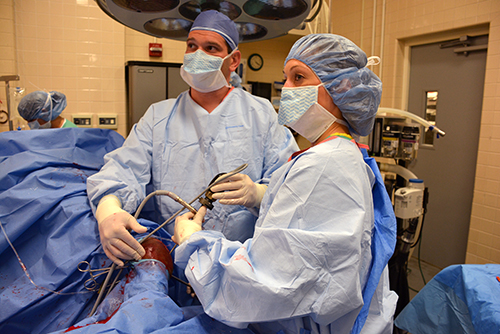 Liam’s mobility improved dramatically. When he arrived, he was barely able to walk; not long after the surgery, he could trot. This past March, Levine took an ultrasound and declared the black draft gelding ready to go back to work as a member of the Lancaster City Police Mounted Unit.
Liam’s mobility improved dramatically. When he arrived, he was barely able to walk; not long after the surgery, he could trot. This past March, Levine took an ultrasound and declared the black draft gelding ready to go back to work as a member of the Lancaster City Police Mounted Unit.
Officer Eric Lukacs has been Liam’s rider and caregiver for the past for nine years. “I am so in tune with him. I know his likes and his dislikes,” he said. Lukacs reintroduced Liam to regular patrol duties by slowly exposing him to his work environment again, with its crowds of people, traffic, and city noise.
By late spring, Officer Lukacs and Liam were back to full-time street duty. “Thanks to you all, he has been 100 percent,” he told New Bolton Center staff earlier this year. “He is even scheduled to work a number of concerts and also assist the Philadelphia Police in crowd control during the Pope’s visit.”
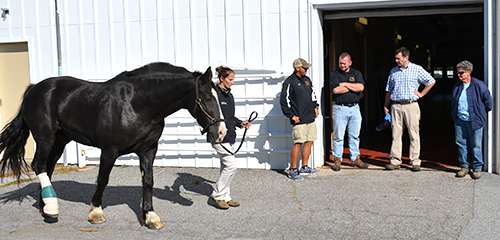 “There is no more devoted owner than a police officer concerned for his horse,” said Dr. Corinne Sweeney, Associate Dean for New Bolton Center and Professor of Medicine. “They’re a team, out there taking risks.”
“There is no more devoted owner than a police officer concerned for his horse,” said Dr. Corinne Sweeney, Associate Dean for New Bolton Center and Professor of Medicine. “They’re a team, out there taking risks.”
New Bolton Center has experienced tremendous changes over Dr. Sweeney’s 37 years with the hospital. When she started, there were no computers or digital diagnostic tools such as CAT scans and MRIs for treatment and research.
Notwithstanding these positive additions to veterinary medicine, the law enforcement horses benefit from those consistent underlying practices essential to good medicine: a thorough physical exam and attention to detail, Sweeney said.
“How can we help those in law enforcement? By helping their horses. It’s our way of saying thank you,” she said.